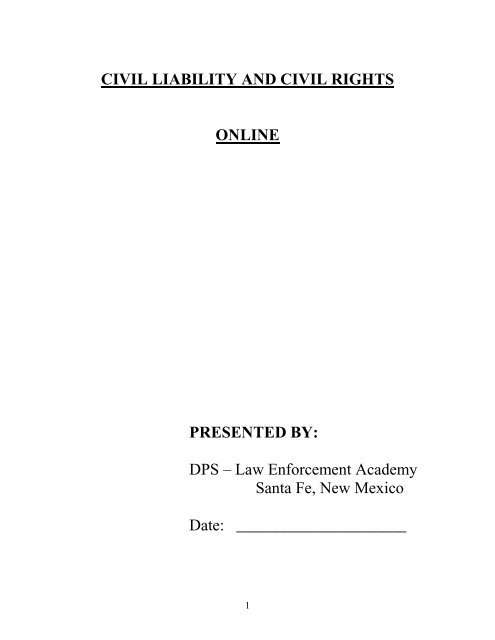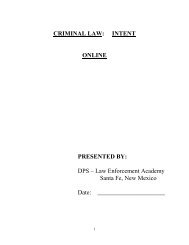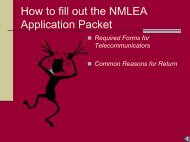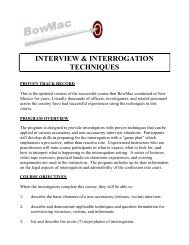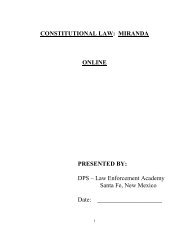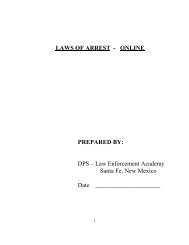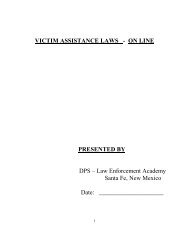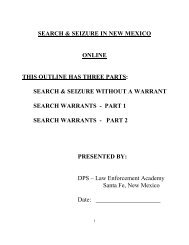Civil Liability and Civil Rights - NMDPS Law Enforcement Academy
Civil Liability and Civil Rights - NMDPS Law Enforcement Academy
Civil Liability and Civil Rights - NMDPS Law Enforcement Academy
You also want an ePaper? Increase the reach of your titles
YUMPU automatically turns print PDFs into web optimized ePapers that Google loves.
CIVIL LIABILITY AND CIVIL RIGHTSONLINEPRESENTED BY:DPS – <strong>Law</strong> <strong>Enforcement</strong> <strong>Academy</strong>Santa Fe, New MexicoDate: _____________________1
INTRODUCTIONFor much of the <strong>Academy</strong>, the emphasis of the legal classes is criminal law. These areinteresting classes which include laws of arrest, Mir<strong>and</strong>a, search <strong>and</strong> seizure, <strong>and</strong> manymore.But there is another component of the legal system, civil liability <strong>and</strong> civil rights,that’s also fascinating <strong>and</strong> interesting. Sometimes we’re witnesses on civil cases butsometimes we’re the ones being sued.Police departments have different approaches to lawsuitsThe passive approachA surprising number of officers have a passive approach to lawsuits. You canhear it in the way they talk: “I’m going to get sued anyway,” “Every officer gets sued,”“You’re not doing your job if you don’t get sued,” <strong>and</strong> so forth. Their agencies reflectthis passive attitude: when sued, they simply write checks to the other side.The positive attitudeBut there is another attitude, one that approaches this challenge differently: we’regoing to underst<strong>and</strong> everything about lawsuits, we going to underst<strong>and</strong> where those whosue us are coming from, we’re going to underst<strong>and</strong> what are the most common types oflawsuits, <strong>and</strong> we’re going to be so well prepared that we will know how to avoid lawsuitsagainst us.This is an affirmative, pro-active approach. Over twenty-five hundred years ago, afamous Chinese philosopher, Sun Tzu, wrote a book called The Art of War. The greatestgeneral, he said, is not the one who wins a victory but one who is so well prepared thatthe other side chooses not to fight. These are the two different approaches. For purposesof this class, we’ll follow Sun Tzu.What is civil liability?• Every person in America is guaranteed certain civil <strong>and</strong> constitutional rights.• If an officer violates these rights, the state becomes liable to the victim.• <strong>Civil</strong> refers to the civil court system as opposed to the criminal justice system;liability means the state is responsible for compensating the other person.• Compensation is in the form of money (damages).• Although we will be discussing civil liability in the context of lawsuits againstlaw enforcement, other agencies can also be sued for monetary damages.3
Can one case go to both criminal <strong>and</strong> civil court?Yes. This occurred in the OJ Simpson case. He was found not guilty in thecriminal case. The family of one of the victims – Ron Goldman – sued OJ Simpson forwrongful death <strong>and</strong> was awarded thirty million dollars. Officers testified in both thecriminal <strong>and</strong> civil trials.It’s not double jeopardy because criminal law <strong>and</strong> civil law are two different legalsystems. Another example: Suppose an officer uses excessive force on an individual. Hemay be prosecuted for battery in criminal court <strong>and</strong> sued for damages in civil court.Examples where officers are witnesses in a civil case for a victim• A vehicular homicide occurs. The officer asks a highly intoxicated driver when hehad his last drink <strong>and</strong> where. The driver names a bar. If the victim’s estate suesthe bar, the officer is likely to be called as a witness.Basic terms <strong>and</strong> legal principles about civil liabilitySome definitions will help us:What is immunity?For a long time the government or the state couldn’t be sued. Over the years thathas changed. Judges have immunity but police officers have qualified immunity <strong>and</strong> canbe sued.What is the difference between a tort <strong>and</strong> a crime?• The word “tort” is confusing to many people. And yet, tort is all around us. Thelawsuits that make headlines – tobacco, a person injured – are based on tort.• Tort is an old French word meaning “injury.” A tort is a wrongful act by oneperson that gives another person the right to sue him or her. The victim wantsmoney, known in court as damages. When two parties in a civil case resolve adispute prior to trial, it’s called a settlement.• A crime is a wrong against the person or property of another for which theremedy is fine/imprisonment or both. When a case is resolved before trial in acriminal case, it’s called a plea bargain.On the road to suing an officer: deep pocket, contingent fee, risk managementA person who sues another is far more interested in the agency or business thatperson works for. One could personally sue an officer but the reward would be minimal.Sue the county or city that the officer works for, however, <strong>and</strong> one can recover more.4
That’s because the agency is liable for the actions of its employees. This is known asgoing after the officer’s deep pocket.A person who wants to sue an agency may not be able to afford a lawyer or theexpenses of a lawsuit. In that event, a lawyer may work on a contingent fee basis. Thelawyer will put up expenses <strong>and</strong> get ready for trial. The lawyer’s fee is determined by thesettlement. Usually the lawyer will get about one-third of the settlement.Is there anyone working for the officer? Yes, the agency the officer works for willprovide an attorney to represent the officer. Also, the agency will have an insurer,sometimes called risk management. Money awarded to the person suing will come fromrisk management, not the officer.Reminder:Even though not financially liable, an officer may still face adverse consequences.Does the agency always represent the officer? Almost always, since generallywhat the officer does is in the scope of his or her duties. Officers who do something offduty,or outside the scope of their duties (committing a crime, for example), may have torepresent themselves.But even when an officer has committed a crime, the agency he or she works formay be liable for damages.The difference between intentional <strong>and</strong> negligent tortsOne way to have a strategy against lawsuits is to know what kind of lawsuits we arefacing. If we know what the problems are – the minefields – we can use trainingopportunities to avoid them.We will be discussing two kinds of torts that can lead to lawsuits:1. Intentional tortThis is doing an act which is substantially certain to cause injury or harm toanother. More than negligence, an intentional tort requires some sort of motive ordeliberate fault. Example: Assault <strong>and</strong> battery after a person has been h<strong>and</strong>cuffed.2. Negligent tortThe most common tort allegations stems from negligence. Sometimes it’s simpleor mere negligence – usually someone wasn’t thinking or didn’t use common sense <strong>and</strong>made a mistake. Gross negligence is when an officer has a conscious or recklessdisregard for the rights of others. Example: Negligent arrest.But just because we’re negligent doesn’t mean we’re liable. There must be asituation where an officer had a legal duty to the person (the plaintiff), the officer5
eached or failed to perform that duty, <strong>and</strong> that breach of duty led to harm by the suingparty (the plaintiff).Type of damages that can be awarded• If officer is negligent, general <strong>and</strong> compensatory damages are available.• If officer’s actions are intentional, in addition to general <strong>and</strong> compensatorydamages, punitive damages may be awarded.• A jury awards punitive damages to “send a message.”Positive <strong>and</strong> negative views about lawsuitsWhen it comes to lawsuits in America, people have definite opinions: they eithersupport them or are against them. Some of their views follow:Positive views on lawsuits - Some Arguments in favor of lawsuits• <strong>Law</strong>suits offer a way for a citizen, regardless of status, to have a remedy if theyare a victim of a wrong against them.• Auto companies. There is a car you don’t see much on the road: the Ford Pinto.In the interests of saving money, Ford decided not to put a fire wall between thegas tank <strong>and</strong> the rest of the car. When the car was rear-ended, it caught on fire. Ifyou or your family were the victim, should you have a remedy?• Tire companies. On a number of Firestone tires, the tread was coming off at acertain speed. The defective tires could be traced to one inefficient plant in Ohio.<strong>Law</strong>suits force companies to be more efficient. Should you or your family have aremedy when a company sells you a defective product?• Drug companies. A drug given to pregnant women results in babies without armsor legs. Should the drug companies be held accountable?• Without checking the indicators on an arrest warrant, a police officer arrests ayoung man – same name, wrong person. That person spends a week in jail beforebeing released. Should that person have a remedy?Negative views on lawsuits- Some Arguments against lawsuits• Some call it “legalized extortion” – paying money to someone suing you to avoidtrial.• America have over one million lawyers, over half of the lawyers in the world.• There is an old saying, “If you have one lawyer in town, he or she will go broke.If you have two lawyers in town, they’ll both get rich.” There is a perception thatlawyers benefit the most from our civil law system.• Medical malpractice is expensive. Some doctors avoid certain areas of themedical profession because of lawsuits.• Due to lawsuits, it’s very expensive for drug companies to come out with newdrugs that can benefit society.6
• Some people hesitate to join law enforcement because of concern of lawsuits.Some observations on positive <strong>and</strong> negative views of lawsuits• When it comes to lawsuits, we need to realize there isn’t a one-sided easy answer.• To be effective, we need to underst<strong>and</strong> where the other side is coming from.• <strong>Law</strong> enforcement is no different than any other agency or institution. Quitesimply, if we don’t do a good job, or violate people’s constitutional rights, weprobably deserve to get sued.• We need to question why some police departments are sued more than others.• We need to know our weaknesses.• We need to be able to make recommendations to reduce or prevent lawsuits.Two court systems:State <strong>and</strong> federalState:• Previously sovereign immunity was the rule which meant a citizen could not suethe state at all. The New Mexico Tort Claims Act changed this <strong>and</strong> providedcitizens with a remedy for misconduct by the state.• <strong>Liability</strong> can occur for torts within the scope of the officer’s duty, violation ofproperty rights, or violation of any rights provided by the US <strong>and</strong> New Mexicoconstitutions.• The State, unlike the federal government, has a limit on damages.Federal:We will discuss the two main federal statutes often used to bring an action intofederal court.Federal criminal liability - “241, 242”“Criminal <strong>Liability</strong>”• The full title is 18 USC 242.USC st<strong>and</strong>s for United States Code• Used in police brutality cases.• Federal law imposes criminal sanctions against law enforcement officers whodeprive individuals of their civil rights.• Specific intent statute. Police officer must have the specific intent to violate therights of the victim at the time of the deprivation.• This carries criminal sanctions which could be a fine <strong>and</strong>/or incarceration.7
• Section “241” refers to conspiracy to violate civil rights.Federal <strong>Civil</strong> <strong>Rights</strong> Action - “1983”“<strong>Civil</strong> <strong>Liability</strong>”• The full title is 42 USC 1983 but lawyers call this a “1983” lawsuit.USC st<strong>and</strong>s for United States Code.• This statute allows citizens to sue for deprivation of constitutional rights in federalcourt.• Now one might ask: if a state or local officer is being sued, why would that casego to federal court? There are historical reasons for this. After the <strong>Civil</strong> War, newConstitutional amendments guaranteed civil rights for all people.• But in some southern states, state <strong>and</strong> local officials continued to violate civil <strong>and</strong>constitutional rights of people, especially African Americans. The purpose ofsection 1983 is to provide a way for citizens who are injured by the actions ofstate or local officials to recover damages.• Example: in 1961 the United States Supreme Court decided Monroe v. Pape.Chicago officers entered Monroe’s apartment at night, without a warrant, <strong>and</strong>questioned him for ten hours. Monroe was never charged. Supreme Court said thiswas a violation of Monroe’s Fourth Amendment rights <strong>and</strong> that he was entitled tosue in federal court for damages.• This statute creates a cause of action against a police officer, in the performanceof his or her duty, who deprives another person of any federally protected right orother statutory right.• One can sue in either state or federal court but some lawyers prefer federal court.This is because New Mexico, unlike federal court, has a cap on the amount ofdamages that can be awarded.• Some examples of where police misconduct can result in civil liability undersection 1983: illegal search <strong>and</strong> seizure, excessive force, assault <strong>and</strong> battery,coerced confessions, discriminatory prosecutions, false arrest <strong>and</strong> imprisonment,<strong>and</strong> deadly force.On the way to court:Types of <strong>Law</strong>suits against law enforcement• We have discussed intentional <strong>and</strong> negligent torts. We will now look at sometypes of cases that often end up in federal court.Type of case that could go to federal court: Failure to Protect“I’m a cop, not a social worker.”8
In the old days, many officers felt their responsibility was simply to apprehend<strong>and</strong> arrest people. In Canton v. Harris (1989), a severely emotionally disturbed lady wasplaced in custody. She was incoherent <strong>and</strong> fell down several times. None of the officersmade any effort to help her.The United States Supreme Court held police inaction can result in civil liabilityfor both officers <strong>and</strong> their agency. Today, an officer would help that person.• Is law enforcement better or worse off with the new st<strong>and</strong>ard of duty to protect?Answer:Most officers believe the new st<strong>and</strong>ard, which gives officers a duty to protectcitizens, has helped improve the image of law enforcement.FACTS:It’s the early morning hours in a rough part of town. Police officers stop a vehiclefor a broken tail light. The young couple inside had just left a local night club.Investigation reveals that the driver was intoxicated. He is arrested <strong>and</strong> the vehicle istowed. The young lady – dressed for Saturday night – is left on the sidewalk.She asks the officer for help. The officer replies, “Lady, it’s not my problem. Youshould have thought of this before you go into a car with a drunk driver.” The officerleaves. Within the hour she is knocked down <strong>and</strong> her purse is taken.• Should the officer or his department be held liable?Answer:This happened to the Albuquerque Police Department (before cell phones becamewidely available). The department was held liable for injuries to the young lady.Recommendation:If a person in this situation does not have a cell phone, Dispatch may be able tocontact someone.Some other categories of failure to protect:All of these categories represent actual lawsuits against police agencies.• Failure to respond to crime.• Failure to protect informants.• Failure to warn of danger.• Failure to arrest a dangerous motorist.9
• Failure to prevent escapes or negligent release.• Failure to adequately protect persons in police custody.• Failure to provide emergency medical services.• Failure to protect property in evidence.• Negligently mish<strong>and</strong>ling of emotionally disturbed or special needs of individuals.The great majority of lawsuits seem to occur because of lack of common sense orsomeone wasn’t thinking. We need to ask what could have been done to avoid theselawsuits.Type of case that could go to federal court: Use of ForceExamples of where law enforcement officers can be held liable for excessive force:• Continue to use force after resistance has ended.• Use chemical agents to excess.• Use excessively severe restraints.• Comm<strong>and</strong> dog attacks or bites.• Use force to cause unnecessary injury.• Use of force is discussed extensively in another class. Unfortunately, excessiveforce complaints are the basis for many lawsuits against law enforcementofficers.• The st<strong>and</strong>ard to follow: Officers are expected to apply only the force that isreasonable in order to resolve a given situation. When resistance stops, forceshould stop.• New Mexico follows the Tennessee v. Garner st<strong>and</strong>ard for deadly force whichholds that an officer must have probable cause to believe either he/she or anotheris in imminent danger of death or serious bodily harm.• When deadly force is used, the estate of the deceased person may sue forwrongful death.• Agencies that may review deadly force include the officer’s agency, the DistrictAttorney’s office or the Department of Justice.10
Type of case that could go o federal court: High Speed Pursuit• In County of Sacramento v. Lewis, the United States Supreme Court held that thest<strong>and</strong>ard for liability is “shocking the conscience.”• It is important for officers to follow agencies’ policies <strong>and</strong> procedures where highspeed pursuits are concerned.Type of case that could go to federal court: Search & Seizure• Search & Seizure falls under the Fourth Amendment. The following are somecategories that may be actionable as unreasonable under the Fourth Amendment.• Overly intrusive <strong>and</strong> degrading searches.• Strip searches.• Improper execution of a search warrant.• Searching the wrong premises.Type of lawsuit that could go to federal court: NegligenceExamples of Negligence:• Negligent use of chemical weapons.• Negligence in personnel matters – hiring.• Negligence in training.• Negligence in supervision.But why wait for lawsuits?: One department’s responseThe key to avoiding lawsuits is legal training <strong>and</strong> imagination. The following,from Albuquerque, New Mexico, was a new approach for working with the homeless:Collaborative Effort: Albuquerque Police <strong>and</strong> outreach groups work together to help thehomeless.Of the hundreds of officers dealing with Albuquerque’s homeless, a small groupbased downtown has been doing the almost unthinkable. The police, with social <strong>and</strong>outreach workers, walk the sidewalks <strong>and</strong> visit parks, looking for homeless people whoneed help – whether it’s a night shelter or the first step toward a better life.11
Officer Liz Thomson said, “It’s almost like, didn’t someone’s common sense sayto do this long before? The team effort (police officers <strong>and</strong> social workers) is what hascompletely changed our impact. When you put the two together, the effect <strong>and</strong> the levelof trust has been amazing.” Officer Jerome Armijo: “It’s all turned out to be a positivething.” Albuquerque Journal, January 8, 2007.A positive note for New Mexico:Throughout New Mexico, police departments are engaged in more legal training<strong>and</strong> adopting an affirmative, pro-active approach. These departments support theirofficers, seek out imaginative solutions, <strong>and</strong> are prepared to confront lawsuits that maycome their way. Sun Tzu would be proud.How police departments can minimize liability• Follow department policy <strong>and</strong> legal training.• Stay current with legal developments. If a department loses a civil caseanywhere in New Mexico, the word needs to go out to other departments.• Use a tape recorder whenever possible.• If in doubt, contact the District Attorney or legal division before taking action.• Carefully document each case or incident.• Use imaginative approaches that reduce conflict with citizens.• Underst<strong>and</strong> legal st<strong>and</strong>ards such as reasonable suspicion <strong>and</strong> probable cause.• Departments need to put continued emphasis on ethics <strong>and</strong> integrity. DistrictJudge “Pat” Murdoch from Bernalillo County has often said, “You don’t sellyour integrity all at once. You give it away a bit at a time <strong>and</strong> then one day youlook over your shoulder <strong>and</strong> it’s no longer there.”CONCLUSION• For a police department, it is important to be innovative, to stay current with legaltraining, <strong>and</strong> to use common sense. This will reduce liability but, moreimportantly, is also effective policing12


